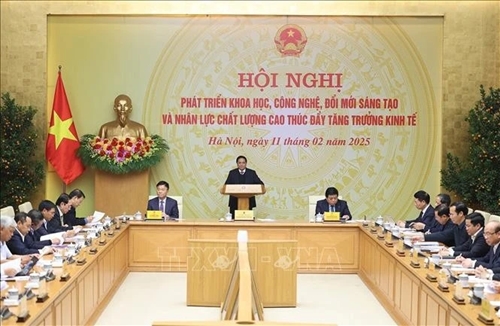In his address, Prime Minister Pham Minh Chinh asked relevant ministries and the Government Office to collect feedback at the event to propose a draft directive for this national effort.
Sci-tech, innovation, digital transformation, and workforce quality improvement are objective requirements, strategic choices, and top priorities, he said, adding that they must be centered around the people and businesses, making them the core drivers of the process.
    |
 |
|
Prime Minister Pham Minh Chinh speaks at the conference. |
He reflected on Vietnam’s achievements in these areas, highlighting how they have propelled economic development across sectors, including agriculture.
Referring to the contents of the Resolution on breakthroughs in the development of sci-tech, innovation, and digital transformation, as well as the Government's action plan for the resolution, Prime Minister Pham Minh Chinh urged ministries, agencies, localities, research institutes, universities and businesses to focus on their nine assigned tasks and solutions. Any relevant institutional, procedural, and policy bottlenecks should be addressed by the second quarter this year, he stressed.
The Prime Minister also outlined plans to accelerate the development of critical infrastructure spanning digital, information technology, transport, healthcare, education, sport, energy, cultural and entertainment infrastructure, which should be integrated with the establishment of innovation centers and diversification of domestic and foreign resources, including state, private, and public contribution, adding this should be done through public-private partnerships, loans, and government bonds.
The Government leader directed a sweeping overhaul of the education system at all levels, from secondary to university and post-graduate studies, to cultivate a contingent of specialists and deepen their expertise. This includes expanding domestic and international training courses, and issuing mechanisms to attract top talents.
He ordered smart governance to optimize management, eliminate bureaucratic processes, and promote decentralization, with power-sharing alongside appropriate resource allocation.
Thanking foreign technology corporations for their contribution to Vietnam’s development, Prime Minister Pham Minh Chinh called for facilitating technology transfer, especially core and foundational technologies, to drive development in priority sectors.
Ministries, agencies, localities, research institutes, universities, businesses and scientists, based on their respective roles, tasks and responsibilities, must work closely together, he said, adding that placing national interests above all else, they must embrace principles of fair competition, effective coordination, mutual benefits, and shared risks.
Representatives from technology groups such as Google, Nvidia, and Samsung pledged to support Vietnam’s development of big data and artificial intelligence, offering free courses and materials to Vietnamese students.
Last year, Vietnam ranked 44th out of 133 countries and territories in the Global Innovation Index (GII), becoming an ideal destination for international events related to innovation and startups.
Source: VNA